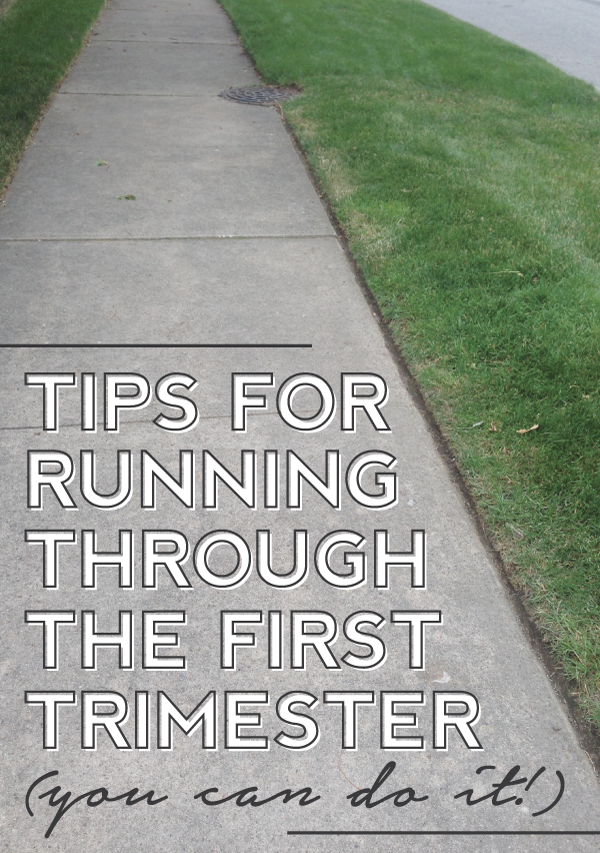
In 1997, I fell in love with running. At the ripe old age of 12, I found my stride pounding the pavement in my size 5 Nikes. Barring the times I was sidelined by pesky stress fractures, I have been running for nearly 20 years. This does not qualify me as a running expert by any means, but it does give a little background to my love of running. I know running isn’t for everyone, but it is most certainly for me. Below, you’ll find my eight tips for running through the first trimester. Some will apply to you, some will not. I simply wanted to share my experiences because I ached for real-world perspective on running through pregnancy during my first few months with a bun in the oven.
TIP #1: Listen to your body. Forever and ever, amen. I was blessed to have a relatively nausea-free first trimester {please don’t hate me!}, so thankfully, this did not impact me getting out the door for a run. It was the intense fatigue which really slowed me down, literally and figuratively, in my first 13 weeks. My last run longer than 3.1 miles was the week I found out I was pregnant. I made a pact with myself to be happy with getting in a 5K and not pushing myself beyond my comfort zone for more miles. As one might expect, my first trimester miles were not pretty. Fatigue prevented me from being incredibly consistent, so I aimed to run every 2-3 days. I didn’t beat myself up if a nap took precedence over a run. Neither should you.
TIP #2: Don’t let your fear of miscarriage keep you off the road. After our loss last fall, I was especially anxious to run at the beginning of this pregnancy. My OB reassured me that my running had nothing to do with the loss of that child. For me, running was the release I needed to help me get through those uncertain weeks. I needed to spend the time on the road to wrap my head around everything. Running provided peace amidst the craziness of my emotions.
TIP #3: Be alert. This will sound like a goofy suggestion, but follow me here. Don’t use the first trimester to try out crazy new trails and pathways. Even with a baby on board the size of a blueberry, you will be concerned about falling while running. During my first trimester {and beyond}, I made peace with running similar routes on a regular basis. I also made sure not to run when it was too dark {or bright!} to keep a clear view of my footing. Safety first — especially with baby on board.
TIP #4: Don’t beat yourself up if you can’t keep running. I’m the first to admit that some days were easier than others. I struggled a lot in the beginning with my bladder {sorry, it’s true}. My first trimester runs were plagued with frantic bathroom hunts mid-run. Coupling these bathroom trips with the need to stay hydrated is difficult as well. You can find the right balance; it just takes patience. All I can say is that running while pregnant does get better in the second trimester. Just keep on trucking…
TIP #5: Pay attention to what smells you’ll be encountering on your run. This is a totally random tip, but trust me: when you accidentally run by a fragrant Indian restaurant, you’ll know what I mean. Avoid highly smelly places as best you can to keep your sniffer happy. I knew where road construction was to stay away from smelly tar. While smells can always catch you off guard, pre-run planning can go a long way if you have a sensitive nose during the first trimester.
TIP #6: Invest in a few looser fitting tops so you don’t feel self-conscious in your workout gear. While every pregnancy is different, your bump won’t likely be bumping until the second trimester. I have gained weight throughout my entire pregnancy, all starting in my midsection and chest. I felt hyper-aware of the muffin top phenomenon, especially toward the end of my first trimester. If you don’t want to buy a new maternity running wardrobe just yet, a few of your husband’s t-shirts will do. {cv} had plenty to share, so I just popped on one of his shirts when I was feeling “doughy”. {It’s hard to explain because pregnant bellies grow at such different rates.}
TIP #7: Open your eyes to the joys of walking. I wrote a post earlier in the year about my daily 10,000 step challenge. Don’t get me wrong: walking will never replace my love of running. I simply focused on moving in my first trimester, whether it was at a jog or a stroll. Because of my recurring stress fractures, I cannot run consecutive days. Walking helped me fill the void — and gave me a ‘pass’ on the days when I just didn’t have the energy to run.
TIP #8: You will slow down: the sooner you accept it and move on, the better. I am not a Boston qualifier, but I am a dedicated runner. My pacing is steady and rarely fluctuates over the course of a run. {This only qualifies if I’m running a relatively flat course, not beastly hills.} Prior to this pregnancy, my average pace hovered in the low-8:00 miles. During my first trimester, I tacked on a good 30 seconds to each mile. It was tough to accept the slow down in the beginning — until I remembered the miracle happening inside of me. I learned to listen to my body {à la tip #1} and find a new rhythm which worked for me.
The bottom line with this post is that running in your first trimester is totally doable. The circumstances have to be right, of course, but you should never see a positive pregnancy test as the end to your running days. With two trimesters of running under my belt {or bump — however you want to look at it}, I have plenty more to share about running through the next trimester too. Keep an eye out for a post on running from weeks 14 to 28 soon! If you ran in your first trimester, I’d love for you to share your tips below. I don’t have all the answers 😉 Happy trails — or better yet, clear sidewalks! xoxo {av}
DISCLAIMER: I was cleared by my obstetrician to run during my pregnancy. Please discuss your activity regimen with your health care professional prior to any physical exercise. If you haven’t been running prior to pregnancy, it would be best for you to wait to begin a running regimen after the baby is born. With this post, I intend to share my takeaways from running in the first trimester. I am not a medical professional, so please see this post as a conversation between friends — not a physician or fitness coach.
